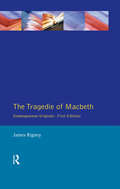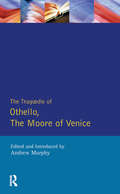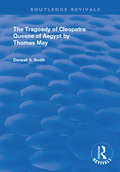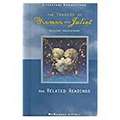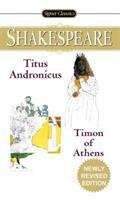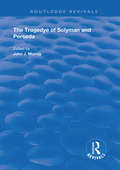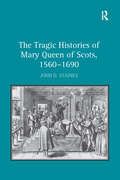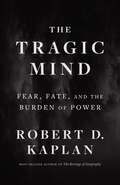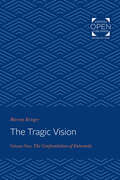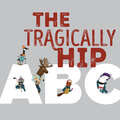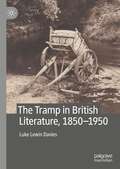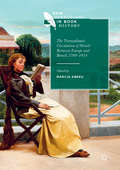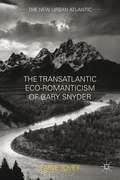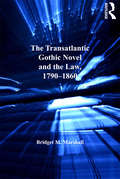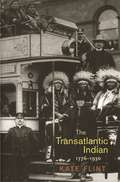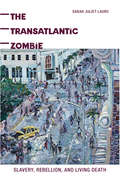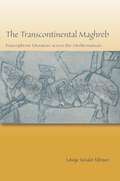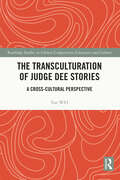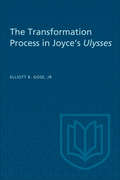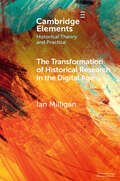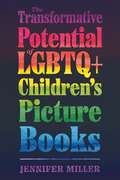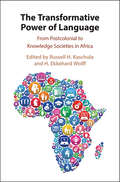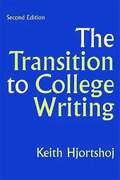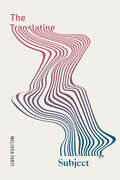- Table View
- List View
The Tragedie of Macbeth: The Folio of 1623 (Timeless Shakespeare)
by James RigneyThe Shakespearean Originals Series takes as its point of departure the question: "What is it that we read Shakespeare?" The answer may seem self-evident: we read the words that Shakespeare wrote. But do we? In the case of all the major editions of Shakespeare available in the market, the fact of the matter is that many of the words that we read in an edition of, say, Hamlet, never appeared in the text as it was printed during or shortly after Shakespeare's own lifetime. They are the interpetations and interpolations of a series of editors who have been systematically changing Shakespeare's text from the eighteenth century onwards. This volume offers the text of Macbeth, as printed in the 1623 First Folio.
The Tragedie of Othello, the Moore of Venice
by William ShakespeareThe "Shakespearean Originals" series aims to provide readers of modern drama with 16th- and 17th-century playtexts which have been treated as historical documents, and are reproduced as closely to their original printed forms as the conditions of modern publication will permit. Each volume in the series comprises a general series introduction, an introduction to the play, the original text, a select bibliography, full annotations and some sample facsimile pages from the text itself.
The Tragedy of Cleopatra: Queene of Aegypt (Routledge Revivals)
by Denzell S. SmithPublished in 1979: No earlier edition of this play offers a satisfactory text because an old-spelling critical edition requires a conflation of the author's autograph manuscript and the first printed edition of 1639. Further, this play, while illustrating Caroline skepticism concerning the character of a personage long famous in narrative and dramatic literature as well as in history, departs from the literary tradition of the preceding three centuries. An account of the reasons for its departure invites consideration of its sources, but more important, of the beliefs of the dramatist's contemporaries as shown in both life and literature.
The Tragedy of Romeo and Juliet
by Mcdougal LittelA textbook reader for young adults features William Shakespeare's "Romeo and Juliet," plus short stories, poems, and essays designed to build reading comprehension.
The Tragedy of Titus Andronicus: The Life of Timon of Athens
by William ShakespeareAs part of the Signet Classics Shakespeare Series edited by Sylvan Barnet of Tufts University, this edition includes commentaries on both plays as well as up-to-date production histories.
The Tragedye of Solyman and Perseda: Edited from the Original Texts with Introduction and Notes (Routledge Revivals)
by John J. MurrayPublished in 1991 The Tragedye of Solyman and Perseda is a late Elizabethan romantic tragedy by Thomas Kyd, author of The Spanish Tragedy. It dramatises the triangular relationship of the Turkish emperor Soliman, his captive Perseda and her beloved Erastus against the fictionalised backdrop of the Turkish invasion of Rhodes in the early sixteenth century. This volume contains the original text along with textual and critical notes.
The Tragic Histories of Mary Queen of Scots, 1560-1690: Rhetoric, Passions and Political Literature
by John D. StainesAuthor John Staines here argues that sixteenth- and seventeenth-century writers in England, Scotland, and France wrote tragedies of the Queen of Scots - royal heroine or tyrant, martyr or whore - in order to move their audiences towards political action by shaping and directing the passions generated by the spectacle of her fall. In following the retellings of her history from her lifetime through the revolutions and political experiments of the seventeenth century, this study identifies two basic literary traditions of her tragedy: one conservative, sentimental, and royalist, the other radical, skeptical, and republican. Staines provides new readings of Spenser and Milton, as well as of early modern dramatists, to compile a comprehensive study of the writings about this important historical and literary figure. He charts developments in public rhetoric and political writing from the Elizabethan period through the Restoration, using the emotional representations of the life of this tragic woman and queen to explore early modern experiments in addressing and moving a public audience. By exploring the writing and rewriting of the tragic histories of the Queen of Scots, this book reveals the importance of literature as a force in the redefinition of British political life between 1560 and 1690.
The Tragic Mind: Fear, Fate, and the Burden of Power
by Robert D. KaplanA moving meditation on recent geopolitical crises, viewed through the lens of ancient and modern tragedy “Classical drama provides crucial lessons for policymakers. . . . A road map for effective, well-considered policy.”—Kirkus Reviews Some books emerge from a lifetime of hard-won knowledge. Robert D. Kaplan has learned, from a career spent reporting on wars, revolutions, and international politics in Europe, the Middle East, and East Asia, that the essence of geopolitics is tragedy. In The Tragic Mind, he employs the works of ancient Greek dramatists, Shakespeare, German philosophers, and the modern classics to explore the central subjects of international politics: order, disorder, rebellion, ambition, loyalty to family and state, violence, and the mistakes of power. The great dilemmas of international politics, he argues, are not posed by good versus evil—a clear and easy choice—but by contests of good versus good, where the choices are often searing, incompatible, and fraught with consequences. A deeply learned and deeply felt meditation on the importance of lived experience in conducting international relations, this is a book for everyone who wants a profound understanding of the tragic politics of our time.
The Tragic Vision: The Confrontation of Extremity
by Murray KriegerOriginally published in 1973. Literary critics who have studied tragedy and the tragic vision failed, in Murray Krieger's estimation, to define exactly what they saw as the tragic vision in general terms. An aim of his book is to create a tentative definition of tragic and to flesh out what the author sees as the definition most illuminating of modern literature and the modern mind. In order to do this, Krieger distinguishes between what he sees as the "tragic vision" and "tragedy"—tragedy, from his perspective, is an object's literary form, whereas tragic vision refers to a subject's psychology, the subject's view and version of reality. In light of the shriveling of the tragic concept in the modern world and the reduction of a total view to the psychology of the protagonist, Krieger contends that the protagonist in a tragedy is now more appropriately designated a "tragic visionary" than a "tragic hero."
The Tragically Hip ABC
by The Tragically HipA love letter to The Tragically Hip, one of Canada's most beloved bands, this ABC picture book features illustrations from four renowned Canadian illustrators.The Tragically Hip, fronted by the late Gord Downie, is a legendary, bestselling Canadian band. And now, almost forty years of music can be appreciated in a brand-new way: an ABC picture book! From "A is for Ahead by a Century" to "N is for New Orleans is Sinking" all the way to "Z is for Frozen in My Tracks," this illustrated ode to the band will be enjoyed by readers of all ages. Featuring art from Canadian illustrators Clayton Hanmer, Julia Breckenreid, Bridget George and Monika Melnychuk, this is the perfect gift for Hip fans old and new!
The Tramp in British Literature, 1850—1950
by Luke Lewin DaviesThe Tramp in British Literature, 1850–1950 offers an account of the emergence of a new conception of homelessness in the mid-nineteenth century, which it argues reflects the evolution of capitalism and disciplinary society in this period. In the process it uncovers a neglected body of literature on the subject of the tramp written by thirty-three memoir writers and eighteen fiction writers, most of whom were themselves homeless. In analysing these works, The Tramp in British Literature presents select texts as a unique and ignored contribution to a wider radical discourse defined by its opposition to a societal fixation upon the need to be productive.
The Transatlantic Circulation of Novels Between Europe and Brazil, 1789-1914
by Márcia AbreuThis book brings a renewed critical focus to the history of novel writing, publishing, selling and reading, expanding its viewing beyond national territories. Relying on primary sources (such as advertisements, censorship reviews, publisher and bookstore catalogues), the book examines the paths taken by novels in their shifts between Europe and Brazil, investigates the flow of translations in both directions, pays attention to the successful novels of the time and analyses the critical response to fiction in both sides of the Atlantic. It reveals that neither nineteenth century culture can be properly understood by focusing on a single territory, nor literature can be fully perceived by looking only to the texts, ignoring their material existence and their place in social and economical practices.
The Transatlantic Eco - Romanticism Of Gary Snyder
by Paige ToveyTracing connections between Gary Snyder and his Romantic and Transcendentalist predecessors - Wordsworth, Blake, Emerson, Whitman, and Thoreau - this study explores the tension between urbanization and overindustrialization. The dialectical relationship between Snyder and his predecessors reminds readers that nature is never a simple concept.
The Transatlantic Gothic Novel and the Law, 1790–1860
by Bridget M. MarshallTracing the use of legal themes in the gothic novel, Bridget M. Marshall shows these devices reflect an outpouring of anxiety about the nature of justice. On both sides of the Atlantic, novelists like William Godwin, Mary Shelley, Charles Brockden Brown, and Hannah Crafts question the foundations of the Anglo-American justice system through their portrayals of criminal and judicial procedures and their use of found documents and legal forms as key plot devices. As gothic villains, from Walpole's Manfred to Godwin's Tyrrell to Stoker's Dracula, manipulate the law and legal system to expand their power, readers are confronted with a legal system that is not merely ineffective at stopping villains but actually enables them to inflict ever greater harm on their victims. By invoking actual laws like the Black Act in England or the Fugitive Slave Act in America, gothic novels connect the fantastic horrors that constitute their primary appeal with much more shocking examples of terror and injustice. Finally, the gothic novel's preoccupation with injustice is just one element of many that connects the genre to slave narratives and to the horrors of American slavery.
The Transatlantic Indian, 1776-1930
by Kate FlintThis book takes a fascinating look at the iconic figure of the Native American in the British cultural imagination from the Revolutionary War to the early twentieth century, and examining how Native Americans regarded the British, as well as how they challenged their own cultural image in Britain during this period. Kate Flint shows how the image of the Indian was used in English literature and culture for a host of ideological purposes, and she reveals its crucial role as symbol, cultural myth, and stereotype that helped to define British identity and its attitude toward the colonial world.Through close readings of writers such as Charles Dickens, Elizabeth Gaskell, and D. H. Lawrence, Flint traces how the figure of the Indian was received, represented, and transformed in British fiction and poetry, travelogues, sketches, and journalism, as well as theater, paintings, and cinema. She describes the experiences of the Ojibwa and Ioway who toured Britain with George Catlin in the 1840s; the testimonies of the Indians in Buffalo Bill's Wild West Show; and the performances and polemics of the Iroquois poet Pauline Johnson in London. Flint explores transatlantic conceptions of race, the role of gender in writings by and about Indians, and the complex political and economic relationships between Britain and America.The Transatlantic Indian, 1776-1930 argues that native perspectives are essential to our understanding of transatlantic relations in this period and the development of transnational modernity.
The Transatlantic Zombie: Slavery, Rebellion, and Living Death
by Sarah J. LauroOur most modern monster and perhaps our most American, the zombie that is so prevalent in popular culture today has its roots in African soul capture mythologies. The Transatlantic Zombie provides a more complete history of the zombie than has ever been told, explaining how the myth's migration to the New World was facilitated by the transatlantic slave trade, and reveals the real-world import of storytelling, reminding us of the power of myths and mythmaking, and the high stakes of appropriation and homage. Beginning with an account of a probable ancestor of the zombie found in the Kongolese and Angolan regions of seventeenth-century Africa and ending with a description of the way, in contemporary culture, new media are used to facilitate zombie-themed events, Sarah Juliet Lauro plots the zombie's cultural significance through Caribbean literature, Haitian folklore, and American literature, film, and the visual arts. The zombie entered US consciousness through the American occupation of Haiti, the site of an eighteenth-century slave rebellion that became a war for independence, thus making the figuration of living death inseparable from its resonances with both slavery and rebellion. Lauro bridges African mythology and US mainstream culture by articulating the ethical complications of the zombie's invocation as a cultural conquest that was rebranded for the American cinema. As The Transatlantic Zombie shows, the zombie is not merely a bogeyman representing the ills of modern society, but a battleground over which a cultural war has been fought between the imperial urge to absorb exotic, threatening elements, and the originary, Afro-disaporic culture's preservation through a strategy of mythic combat.
The Transcontinental Maghreb: Francophone Literature across the Mediterranean
by Edwige Tamalet TalbayevThe writer Gabriel Audisio once called the Mediterranean a “liquid continent.” Taking up the challenge issued by Audisio’s phrase, Edwige Tamalet Talbayev insists that we understand the region on both sides of the Mediterranean through a “transcontinental” heuristic. Rather than merely read the Maghreb in the context of its European colonizers from across the Mediterranean, Talbayev compellingly argues for a transmaritime deployment of the Maghreb across the multiple Mediterranean sites to which it has been materially and culturally bound for millennia.The Transcontinental Maghreb reveals these Mediterranean imaginaries to intersect with Maghrebi claims to an inclusive, democratic national ideal yet to be realized. Through a sustained reflection on allegory and critical melancholia, the book shows how the Mediterranean decenters postcolonial nation-building projects and mediates the nomadic subject’s reinsertion into a national collective respectful of heterogeneity. In engaging the space of the sea, the hybridity it produces, and the way it has shaped such historical dynamics as globalization, imperialism, decolonization, and nationalism, the book rethinks the very nature of postcolonial histories and identities along its shores.
The Transculturation of Judge Dee Stories: A Cross-Cultural Perspective (Routledge Studies in Chinese Comparative Literature and Culture)
by Yan WEIThis book views the Dutch Sinologist, Robert van Gulik’s Judge Dee mysteries as a hybrid East-West form of detective fiction and uses the concept of transculturation to discuss their hybrid nature with respect to their sources, production, and influence. The Judge Dee Mysteries authored by Robert van Gulik (1910-1967) were the first detective stories to be set in ancient China. These hybrid narrative combine Chinese historical figures, traditional Chinese crime literature and Chinese history and material culture with ratiocinative methods and psychoanalytic themes familiar from Western detective fiction. This new subject and detective image won a global readership, and the book discusses the innovations that van Gulik’s Judge Dee mysteries brought to both Chinese gong’an literature and Western detective fiction. Furthermore, it introduces contemporary writers from different countries who specialize in writing detective fiction or gong’an novels set in ancient China. The book will meet the interest of fans of Judge Dee stories throughout the world, and will also appeal to both students and researchers of comparative literature, Chinese literature, and crime novels studies.
The Transformation Process in Joyce's Ulysses
by Elliott B. Gose Jr.James Joyce gave a life to Ulysses which is still felt today, after the shock of its realism and the dislocation of its techniques have been absorbed into the traditions they helped to establish. This study demonstrates the sources of that life, how Joyce's characters go through the conflicts he himself experienced and how Joyce was concerned not only with the grotesque potential of life but also with its comic dimension, attempting to transmit that 'feeling of joy' which he adopted early as his artistic commitment. Joyce's belief in the malleability and resilience of man's physical and spiritual nature attracted him to the transformation process as a technique for fiction and as an expression of his belief that we need to be linked with both our higher and lower natures, that the soul is transformed by its immersion in the life of the body. Integrating the views of Giorgano Bruno and Sigmund Freud into his thought and art, Joyce balanced the grotesque and the comic, the realistic and the idealistic, the psychological and the spiritual. Professor Gose traces in detail the development of the two important transformation processes in which Joyce involved Stephen Dedalus and Leopold Bloom. He also demonstrates Joyce's conception of the artist as necessarily involved in such a process himself. Joyce understood the psychopathology of everyday life; he also came to value and make a central concern of his art mankind's residence in the matrix of the bodily functions. Grotesque physical transformations are an important part of Ulysses. In the Nighttown episode Joyce combined the grotesque with the comic to purge Bloom's emotions, and the reader's. Essential as purging was to Joyce, however, he used it only as a preparation for the joyful affirmation of the last two episodes. Joyce reconciles his reader to the comedy of life by providing a cosmic view of our connection with the stars and our own corpuscles, with an eternal process in which our spirits naturally progress through all the forms of the universe. Elliott Gose offers a brilliant interpretation of this high and humane vision, and the transformation processes through which it is expressed.
The Transformation of Historical Research in the Digital Age (Elements in Historical Theory and Practice)
by Ian MilliganHistorians make research queries on Google, ProQuest, and the HathiTrust. They garner information from keyword searches, carried out across millions of documents, their research shaped by algorithms they rarely understand. Historians often then visit archives in whirlwind trips marked by thousands of digital photographs, subsequently explored on computer monitors from the comfort of their offices. They may then take to social media or other digital platforms, their work shaped through these new forms of pre- and post-publication review. Almost all aspects of the historian's research workflow have been transformed by digital technology. In other words, all historians – not just Digital Historians – are implicated in this shift. The Transformation of Historical Research in the Digital Age equips historians to be self-conscious practitioners by making these shifts explicit and exploring their long-term impact. This title is also available as Open Access on Cambridge Core.
The Transformative Potential of LGBTQ+ Children’s Picture Books (Children's Literature Association Series)
by Jennifer Miller2023 CHOICE Outstanding Academic TitleIn The Transformative Potential of LGBTQ+ Children’s Picture Books, Jennifer Miller identifies an archive of over 150 English-language children’s picture books that explicitly represent LGBTQ+ identities, expressions, and issues. This archive is then analyzed to explore the evolution of LGBTQ+ characters and content from the 1970s to the present. Miller describes dominant tropes that emerge in the field to analyze historical shifts in representational practices, which she suggests parallel larger sociocultural shifts in the visibility of LGBTQ+ identities. Additionally, Miller considers material constraints and possibilities affecting the production, distribution, and consumption of LGBTQ+ children’s picture books from the 1970s to the present. This foundational work defines the field of LGBTQ+ children’s picture books thoroughly, yet accessibly.In addition to laying the groundwork for further research, The Transformative Potential of LGBTQ+ Children’s Picture Books presents a reading lens, critical optimism, used to analyze the transformative potential of LGBTQ+ children’s picture books. Many texts remain attached to heteronormative family forms and raced and classed models of success. However, by considering what these books put into the world, as well as problematic aspects of the world reproduced within them, Miller argues that LGBTQ+ children’s picture books are an essential world-making project and seek to usher in a transformed world as well as a significant historical archive that reflects material and representational shifts in dominant and subcultural understandings of gender and sexuality.
The Transformative Power of Language: From Postcolonial to Knowledge Societies in Africa
by H. Ekkehard Wolff Russell H. KaschulaLanguage has played a pivotal role in societal transformation in postcolonial Africa towards the creation of globally competitive knowledge societies; however so far, this role has been under-researched and under-estimated. This volume addresses this gap in the literature, by bringing together a team of globally-recognised scholars to explore the effect of language on African postcolonial societies, and how it has contributed to achieving 'mental decolonisation'. A range of languages are explored, both imported (ex-colonial) and indigenous African, and case studies from different spheres of public discourse are investigated, from universities to legal settings. Demonstrating that multilingualism is a resource for, rather than barrier to, successful transformation, this book brings the intellectualisation and institutionalisation of African languages to the forefront of development discourse, and provides an insightful snap-shot of how current academic research, public discourse, political activism and social community engagement have contributed to societal transformation in South Africa.
The Transition to College Writing
by Keith HjortshojIntroducing essential reading and writing strategies necessary for success in a variety of college courses, Transition to College Writing focuses on that shift from high school to college, offering practical strategies to shed ineffective habits and a more flexible understanding of how to respond to academic challenges.
The Transitive Vampire: A Handbook of Grammar for the Innocent, the Eager and the Doomed
by Karen Elizabeth GordonEverything you ever wanted to know about grammar using humorous examples.
The Translating Subject
by Melissa TantiA recent shift in women’s writing toward multilingual poetics opens the potential for such experimental texts to set up innovative terms of engagement that are queer, feminist, transnational, and decolonizing.The Translating Subject explores how queer women writers use multilingual strategies to create intimacy with the unknown and enable ethical engagement across social, cultural, and linguistic differences. Bringing together theories of the avant-garde with theories of translation, Melissa Tanti analyzes works by three of North America’s most important contemporary experimental writers: Erín Moure, Kathy Acker, and Nicole Brossard. Tanti confirms the radical potential of multilingual writing through close readings of Moure’s multilingual texts, Acker’s overlooked propensity to write in Farsi, and Brossard’s insistence on the importance of writing in languages that are not one’s own. The Translating Subject argues that multilingual writing challenges monolingual norms and what they uphold: limiting conceptions of subjectivity, community, and identity. Drawing on detailed archival research, this book highlights language rights, minoritized languages, and language use, demonstrating that language is full of life-giving possibilities.The Translating Subject proposes that multilingual writing encompasses both an ethos and practical strategies for navigating a life lived in language.
